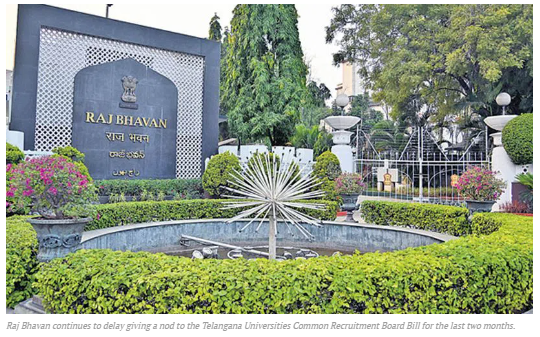Two months on, Governor Tamilisai sits on TS Universities Common Recruitment Bill

Hyderabad: Even as thousands of aspirants eagerly await teacher recruitment at the State universities, Raj Bhavan continues to delay giving a nod to the Telangana Universities Common Recruitment Board Bill for the last two months.
This is despite a team led by Education Minister P Sabitha Indra Reddy personally meeting Governor Dr Tamilisai Soundararajan a week ago to clear doubts raised by her. The delay in giving consent to the Bill is taking a toll on unemployed youth and teacher job aspirants.
The Education Minister’s team had apprised the Governor that recruitment in the State universities would be done in accordance with the University Grants Commission’s (UGC) rules and regulations.
It had also informed her that Table 3 of the UGC regulations — on the minimum qualifications for appointment of teachers and other academic staff at universities and colleges — was also incorporated in the Bill.
Officials of the Higher Education Department had explained to the Governor how in past recruitments, posts would fall vacant in the universities if a candidate with multiple job offers in hand had to choose one. This would not be the case with universities’ common recruitment.
However, according to officials, the Governor has sought a response from the UGC on the provisions incorporated in the Bill. “We are ready to issue notifications for over 2,000 teaching posts in the universities within one month after approval from the Governor,” a senior official said.
Bihar, since the 1960s, has been conducting recruitment to teaching posts in its universities through a separate commission, which is on similar lines to the Telangana Universities Common Recruitment Board.
So far, the universities in the State have been conducting their own recruitments, which gave scope for corruption and favouritism. This apart, these recruitments got into legal hurdles on a few occasions, resulting in delayed appointments.
To ensure transparency and a quick selection process without any corruption and favouritism, the State government constituted the Board, which, except for the medical university, would be holding recruitment to teaching and non-teaching posts in 15 universities.
From issuing the notification to holding interviews, the entire recruitment process would be done by the Board. A screening written test would be conducted for eligible candidates and those shortlisted, based on merit in the exam and roster points, would be called for interviews.
The interviews would be conducted by a panel comprising the Vice Chancellor and subject experts, in accordance with the UGC norms. “The interview procedure has been framed in such a way that a candidate will not know to which board he will be sent for the interview,” the official said.
The selected candidates would be asked to give their preference for the university they wish to join. Based on merit, rule of reservation and preference, the candidates would be allotted the university. The executive council of the university concerned would approve the appointments.







